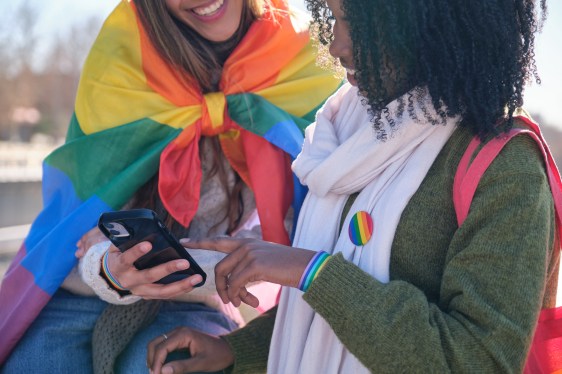When LGBTQ+ youth do not feel safe or accepted in their daily lives, they often turn to the internet to seek community. Two new studies conducted by the Trevor Project and Hopelab and Born This Way Foundation each found that young LGBTQ+ people report greater rates of depression, anxiety, and suicidal thoughts or attempts when they do not have access to safe online communities.
The majority of LGBTQ+ young people agreed that they go online to connect with others because it is difficult to do so in their daily lives, with 38% somewhat agreeing and 36% strongly agreeing, according to the Trevor Project’s study. The Hopelab study similarly found that 44% of LGBTQ+ young people feel very safe in online spaces, compared to just 9% in person.
The research shows that online belonging is particularly important for the mental health of transgender youth. Transgender young people often have little control over their physical surroundings or the level of acceptance in their local communities. However, online spaces can offer an alternative source of support, providing emotional connection, affirming content, and helpful information.
Even in the face of potential negative impacts of social media on teens, which have remained a hot topic among U.S. lawmakers for years, LGBTQ+ youth still report using online spaces. This is possibly due to the variety of benefits they can offer, like a sense of community, support, and resources. These communities foster mutual support. According to Hopelab, 74% of transgender youth reported that they regularly provide encouragement to others online.
Such online communities have become more critical as more than 600 bills affecting LGBTQ+ individuals circulate in the U.S., restricting the expression of queer identity. Twelve states have enacted laws that limit discussions of sexuality and gender identity in schools, potentially isolating LGBTQ+ youth, who already experience worse mental health outcomes due to discrimination and harassment.
While these studies demonstrate that online communities can be beneficial for LGBTQ+ youth mental health, researchers and advocates have expressed concern that new internet legislation could limit teens’ access to these supportive digital spaces. The Kids Online Safety Act, or KOSA, is particularly relevant. It was reintroduced in May after passing in the Senate last year, but failing in the House during the previous session. KOSA would enable the government to hold social media platforms legally accountable for failing to adequately protect minors from harm.
Under an earlier version of KOSA, LGBTQ+ advocates raised concerns about a provision that would allow individual state attorneys general to determine what content is harmful for children. This was a significant concern given ongoing state-level debates over LGBTQ+ rights. After revision, KOSA would give the FTC enforcement authority, a change that addressed concerns from advocacy groups. But when the leadership of the FTC changed hands following the 2024 election, it reignited concerns about potential federal oversight of LGBTQ+ online communities.
Given the impact of unsupportive environments on LGBTQ+ youth, many may experience mental health challenges and turn to online platforms for connection and support. Using these reasons to justify limiting access to online platforms could have harmful consequences, possibly increasing isolation and reducing support for LGBTQ+ youth, thereby exacerbating mental health challenges and suicide risk.

